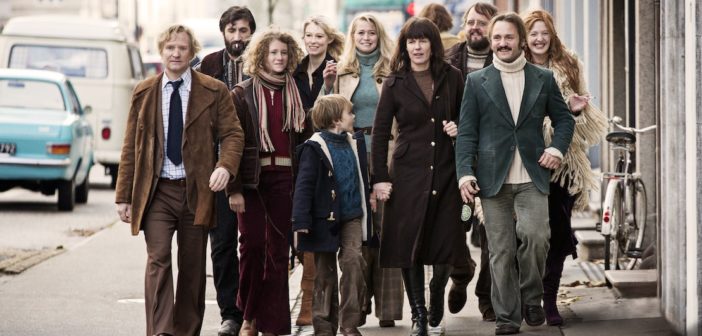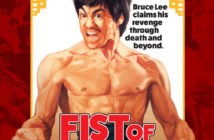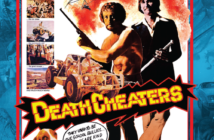The 63rd Sydney Film Festival, Nasheen Moodley’s 6th as curator, was its biggest yet, if not its best, with ticket sales up at least 1.5 per cent from last year’s 176,000, despite ‘competition’ from the Vivid Festival, and festival revenue up 5 percent, largely due to increased ticket prices – now 19 dollars plus booking fee for a single film. Running over 12 days from June 8 to 19, it was also its driest, coinciding with something of an Indian summer in New South Wales. Its cheesy slogan ‘change your view change your world’ was resplendent throughout the city, as if looking for new converts to an already established cohort of film buffs. There were more than 250 screenings, in the State Theatre, the Event Cinemas in George St., Dendy Cinemas in the Opera Quays and Newtown and the Hayden Orpheum in Cremorne, and even a special one-off screening of Ben Wheatley’s film of J.G. Ballard’s High-Rise in the Blacktown Skyline Drive In, Sydney’s only remaining twin drive-in cinema, complete with retro 1950s diner. My limited viewing on a restricted media pass and an even more restricted selection of internet screeners amounted to just eight films, but all of them were worth reviewing (see my separate reviews of Born to Be Blue and Sonita).
The gala opening night event was Aboriginal film maker Ivan Sen’s Goldstone, an ‘outback noir’ which was a sequel to his 2013 opening night film Mystery Road, again featuring indigenous detective Jay Swan, played by Aaron Pedersen, and written, photographed, directed and scored by Sen. It was a fitting focus on Australia’s pre-eminent Aboriginal director, and the film was also in competition with eleven other films for ‘courageous, audacious and cutting-edge’ products, but didn’t win, being pipped by Brazilian film Aquarius, directed by Kleber Mendonca Filo, and starring a 66 year-old Sonia Braga, about a retired music critic battling to save her apartment in the eponymous building from a development company. It was fresh from the 2016 Cannes Film Festival, and is yet to be screened in Brazil, but I missed it. Goldstone proved to be a rather conventional crime film involving Chinese sex traders, and featured Jacki Weaver in a comic role as a rather unlikely corrupt mayor, David Wenham as a gauche corrupt official, David Gulpilil as a tradition bearer, and Alex Russell as a local cop caught between going straight and accepting the corruption. Set in an outback mining town, events lead to a rather ludicrous shoot-out involving Pedersen and Russell against the bad guys. Visually, sonically and atmospherically it is impressive, but as in Mystery Road, with its highly convoluted plot, the story line lets it down somewhat. But it was good to see Sen and Pedersen introducing the film at the Saturday matinee after the gala opening in more down-to earth mode dressed in jeans and thongs.
Also rather confusing, and very grim was the Iranian film Wednesday May 9, a first feature by Vahid Jalilvand, which won a prize at both the Reykjavík and Venice Film Festivals. Three interlinked stories involving a newspaper ad for a mysterious public donation of 30 million tomans (about $US10,000) to a needy person, which causes a near-riot in which the donor is arrested, it involves Leila (played by well known Iranian actress Niki Karimi), who works in a chicken factory and whose husband, played by the director, is paralysed and incontinent, in conflict over using the money for an operation. Somewhat improbably, the donor turns out to be Leila’s ex-fiance, and he promises her at least part of the money. The second tale involves an orphan, Setareh, who lives with her aunt and bitterly jealous cousin. Setareh is in love with Morteza, a lowly caretaker who has been refused her hand in marriage by her aunt a number of times, and in an encounter with her cousin, he breaks his nose and is jailed with a ‘blood money’ fine. Both these threads are very grim, and the final story shifts to the donator, a comfortably-off middle class man who has lost his son because no-one offered him the money to pay for an operation, and whose current act of charity is subjected to the scorn of his wife. Things end reasonably well, but the grimness of women’s lot in the first two stories is what stays with one. Like many Iranian films, it is beautifully shot and very involving.
Werner Herzog’s latest documentary, Lo and Behold: Reveries of the Connected World gets its title from the first email sent in 1969 from UCLA to Stanford University. The intention was to send a message saying ‘Log In’, but the Stanford computer crashed after the first two letters, leaving ‘lo’. This is mainly a series of US male talking heads talking about the internet, computers, self-driving cars, hacking, addiction, online harassment, artificial intelligence, space travel and other aspects of futurology, involving a series of geeks, boffins and the occasional woman, one of whom talks the most sense about space travel being a way of abandoning the mess we’ve made of our earth environment. It’s occasionally droll, especially with Herzog as interviewer, but ultimately rather dry. Cinema Mon Amour is another documentary, set in Romania, where since the fall of Communism 400 state-run cinemas have dwindled down to fewer than 30, and we follow the struggles of Victor Purice, who looks a bit like Philippe Noiret in Cinema Paradiso, to keep the 630 seat Cinema Dacia Panoramic in the Moldavian town of Piatra Neamt open. This involves acquiring a video projector and some dodgy quality DVDs, and supplying his dwindling audiences with blankets and cups of tea when the cinema’s archaic heating system breaks down. His devoted female employees offer faithful support, and he tries to attract children by having a competition to choose their favourite film – the winner is Frozen. Russell Crowe’s Gladiator seems to be the only film poster on display in the foyer, and great nostalgic moments involve an audience of 900 for Titanic – US films seems to be the staple diet. Victor goes on a trip to Germany to see how they do things there –conversing in Italian, a language very close to Romanian, with the cinema owners, and returning rather depressed at his dilapidated fleapit. But he’s an irrepressible optimist, and we see him singing and dancing and even visiting the newly formed Romanian Film Foundation, which is sympathetic but can do little to help. It’s an extreme example of a worldwide situation, where cinemas are closing everywhere, although Cinema Dacia’s seemingly unilateral dependence on US flicks is also depressing.
As mentioned previously, Ben Wheatley and his screenwriter wife Amy Jump’s High-Rise https://www.youtube.com/watch?v=LKPghZ5cc_E was intended as a major event, included in a section called Freak Me Out, organised by Richard Kuipers, who introduced the film. He compared the brutalist ziggurat high rise luxury apartment block in the film to the UTS tower building in Broadway, where I taught and he studied in the 1980s, but the increasing chaos and carnage which take place in Ballard’s novel and the film bear little else in comparison. Tom Hiddleston, the man being tipped as the next James Bond, plays Ballard’s protagonist Dr Laing – possibly a nod to R.D. Laing – trying to stay sane in a hierarchical world full of madness and entropy, and the film’s period setting – Ballard’s book was published in 1975 – is one of its virtues. I even spotted a poster for Karel Reisz’s Morgan: A Suitable Case for Treatment – one of my favourite films – at one point. That said, it’s an oddly unengaging film, with Jeremy Irons in the role of the megalomaniacal high-rise overlord the Architect trying to cope with the increasing degradation and anarchy. At one point Portishead’s version of Abba’s ‘SOS’ breaks through Clint Mansell’s soundtrack, but for me it was too little, too late. The film ends with Margaret Thatcher’s voice explaining the difference between state and outside capitalism, which sums up the period, and perhaps the film’s setting.
Probably my favourite film of the festival was another film set in the 1970s, Danish director Thomas Vinterberg’s The Commune (Kollectivet), with a powerful performance from Trine Dyrholm as Anna, a middle-aged television announcer and instigator of the commune when she, Erik, her university lecturer husband, and teenage daughter Freja inherit a large house, and invite a group of friends and eccentrics to move in with them. Based on the director’s experiences of living in a commune between the ages of 7 and 19, and with superficial resemblances to Swedish director Lukas Moodysson’s 2000 comedy Together, also set in a 1970s commune, where there is a similarly excessive amount of alcohol and drugs. Commune is a more serious film, focusing on Anna’s heartbreak and disintegration when Erik starts an affair with an architecture student in her early 20s, and Anna suggests she moves into the house with them. In the beginning, before the affair, the housemates celebrate their new relationship with a nude swim, and at the end, they are sunbathing, without Anna, and Freja declares her love for her new boyfriend. The portrayal of Anna’s sacrifice for the common good is moving, and Dyrholm won an award for best actress at the Berlin Film Festival. Vinterberg is of course one of the founders of the the Dogme 95 movement along with Lars von Trier, and his 1998 film Festen (The Celebration) was one of the high points of that movement, dealing with abuse within a family. He has had a chequered career since then until The Hunt (2012) with Mads Mikkelsen as a small town kindergarten teacher wrongfully accused of abusing one of his pupils, and his version of Thomas Hardy’s Far From The Madding Crowd (2015). He appears to be right back on track.
Another director with a rather chequered career is Liverpool-born Terence Davies, who turned 70 this year, and made the brilliant, poetic childhood studies Distant Voices, Still Lives (1988), which won numerous awards, and The Long Day Closes (1992), both autobiographical films set in 1940s and ’50s Liverpool, the first of which was voted no.9 in British film magazine Sight and Sound’s top ten films of the past 25years in 2002. His 2008 poetic documentary about Liverpool, Of Time and the City, brought him back to public attention, and his current film, Sunset Song, based on the 1932 novel by Scottish writer Lewis Grassic Gibbon, is a project he has wanted to do since the 1980s but was unable to raise the finance for. Set in Aberdeenshire before WW1, it focuses on Chris, played elegantly by model Agyness Deyn, who together with her mother and brother, suffers the abuse of a cruel, patriarchal father (Peter Mullan), lives on a farm, and dreams of being a schoolteacher. It’s a very conventional film, but the Scottish landscape – it was filmed in both Scotland and rural New Zealand – are almost another character in the film. It’s an epic film, beautifully shot and featuring Davies’ trademark community singing, as Chris overcomes her cruel family environment and marries a gentle farm worker, Ewan, after her father died of a stroke. Her husband, however, is drafted into the war, and comes back a changed man, treating her as brutally as her father did. He is eventually shot as a deserter, and Chris carries on alone with her child on the farm. There are some slightly awkward voice-overs by Chris taken directly from the novel, wheatfields are featured prominently, and Davies shot the picture of 65mm film, which enhances its epic scope. Old fashioned, perhaps, conventional, yes, but powerfully poetic. His forthcoming film about American poet Emily Dickinson, A Quiet Passion, with Cynthia Nixon, which has already been shown at the Berlin Film Festival, is one I’ll be looking out for.
Two very pleasing outcomes from the SFF are that the audience award for best drama film went to the Turkish feature Mustang, about five Turkish sisters coping with the strictures of their patriarchal uncle, and rebelling brilliantly, which I saw on general release in New Zealand last February, and that Portishead have just released a video of their version of Abba’s ‘SOS’ (that appears in High Rise) dedicated to Labour MP Jo Cox, who was brutally murdered last week. The video concludes with Beth Gibbons reaching out her hand, and a quote from the MP’s maiden speech: ‘we have far more in common than which divides us’.




